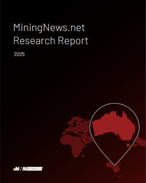This article is 3 years old. Images might not display.
Rio will conduct a A$1.2 million feasibility study, equally funded with ARENA through a $580,000 grant, into using clean hydrogen to replace natural gas in the calcination process of refining at the Yarwun alumina refinery in Gladstone.
The study program includes work to be done at Rio's Bundoora Technical Development Centre in Melbourne, where Rio's in-house development capability has now been extended to hydrogen.
"We see the ARENA and Rio Tinto-funded study as a step towards reducing refinery emissions and one that has the potential to play an important part in Rio Tinto's commitment to decarbonisation," Rio Tinto Aluminium Pacific Operations acting managing director Daniel van der Westhuizen said.
"We're investing in work that needs to be done, not only to decarbonise one of our sites, but also to help provide a lower-emissions pathway for Rio Tinto and the global aluminium industry.
"We recognise we are on a long road towards reducing emissions across our operations and there is clearly more work to be done. But projects such as this are an important part of helping us get there."
One part of the study will comprise preliminary engineering and design work to understand the construction and operational requirements of a potential demonstration project at the Yarwun alumina refinery.
The second work package is the simulation of the calcination process using a lab scale reactor in Melbourne.
Once complete, the study will inform the viability of a potential demonstration project.
Rio has already lodged patents for the hydrogen calcination process.
ARENA CEO Darren Miller said the technical and commercial lessons from the study could lead to the global implementation of hydrogen calcination technology.
According to Wood Mackenzie, the aluminium industry accounted for about 2.6% of the world's greenhouse gas emissions in 2020, with power accounting for close to 60%.
"Decarbonising power sources therefore offers the greatest opportunity for emissions reduction in the aluminium industry - or as a pessimist might have it, decarbonising power sources creates the greatest obstacle to emissions reduction," WoodMac senior vice president, vice chair metals and mining Julian Kettle wrote in a blog post overnight.
But Kettle said emissions from aluminium production were set to rise over the next decade.
"However, the optimist in me believes that ultimately it will be part of the solution by helping to deliver low carbon energy," he said.
"But it's going to take time, and when it comes to tackling the decarbonisation challenge, time is in short supply."
Rio is aiming to reach net zero emissions across its operations by 2050. Across the company, it is targeting a 15% reduction in absolute emissions and a 30% reduction in emissions intensity by 2030, from a 2018 baseline.
























